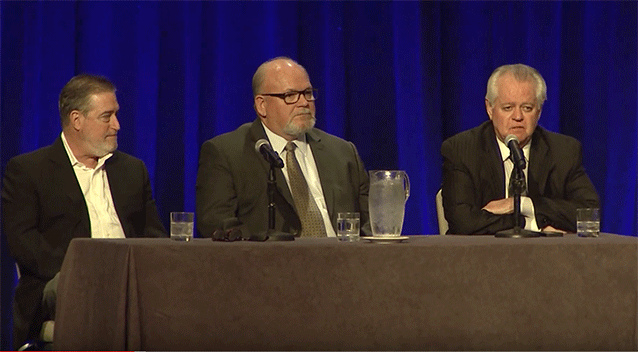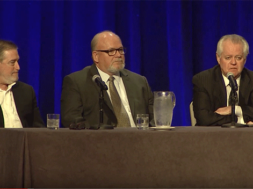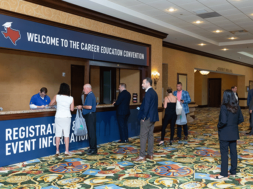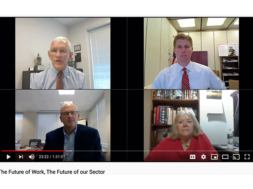
For-Profit Colleges Face Legislation That Could Shut Them Down
Written from Career Education Colleges and Universities (CECU) Convention session titled, State Executive Panel: New Sector Attacks at the State Level
California state legislators have introduced bills that, if enacted, could shut down for-profit colleges in the state, while New York’s governor proposed in his budget a rule that would have caused hundreds of for-profit schools to close.
Those in the for-profit education sector in California and New York warn that similar efforts will likely expand to other states, and that schools and associations must be prepared.
Five panelists presented the inside story of the assault on the for-profit education sector and what it means to others in the sector at the 2019 Career Education Colleges and Universities or CECU Annual Convention in New Orleans in June.
“Our sense is that this is a strategic plan being adopted at the Democratic National Committee that is basically going to be implemented in every state that has private schools,” said Robert Johnson, CEO of the California Association of Private Postsecondary Schools, or CAPPS. “There is $60 million in the pot that The Century Foundation has dedicated to the elimination of our sector. That means that people are on planes, they’re on phones, they’re talking to elected officials about their feelings about the for-profit school sector, and would like to be part of the noble cause of doing away with them.”
Johnson said people have been attacking the for-profit education sector almost non-stop for the 21 years he has been working at CAPPS.
“There are no conservative Democrats left in California,” he said. “There are some moderate Democrats that … view themselves as understanding business and are not antithetically opposed to the private sector. Then you have the progressives … a growing group of Democratic legislators who have taken it upon themselves to essentially reform American society through legislation.”
Those legislators firmly believe that private schools are no good, and that all higher education should be public, he said.
In the past, the California Legislature would propose one or two bills a year aimed at the proprietary education sector that they would then either defeat in committee or negotiate away. But this year, the other side did something else.
First, they coalesced around Robert Shireman, a senior fellow at The Century Foundation who travels the country promoting his agenda, Johnson said. “He started in New York with Gov. Cuomo and then he went out to California where he did something that I’m urging that you … watch out for,” he said.
“We can be effective working with one or two pieces of legislation, but he [Shireman] wrote seven pieces of legislation and found possibly a dozen progressive Democrats to co-author and co-sponsor these seven pieces of legislation,” Johnson said. “The first one, and probably the most devastating one, is to essentially recreate gainful employment in California, independent gainful employment on a national level.”

Under AB-1340, an implementing state agency would work with the Employment Development Department to amend the unemployment insurance code relating to private postsecondary education. The bill would require “an institution, for each of its graduates, to report to the bureau” data including individual identifying information, the program the graduate was enrolled in and the graduate’s student loan debt information. The bill also requires the bureau match the data reported by the institutions with wage data from the EDD to determine if graduates are gainfully employed.
Essentially, that department could go through programs, determine failures and the school would lose its license, Johnson said. “So it’s not a penalty situation; it’s really a death situation.”
Another bill, AB-1341, would make it difficult for for-profit schools to transition to nonprofits, he said. AB-1342 is similar, making the California attorney general responsible for reviewing and approving sales of nonprofit colleges to profit companies. “It beefs up the role of the attorney general at looking at any nonprofit to for-profit conversion, again making it rather difficult to do,” Johnson said.
AB-1344 would require out-of-state online schools that do business in California to essentially become a fully registered state institution under the Bureau for Private Postsecondary Education, Johnson said. “Before … you’d have to essentially register and pay a $1,500 application fee; now you would have to become fully licensed under California (law) and essentially under the authority of the bureau, even if it does conflict with your own state licenses.”
Another bill, AB-1345, is an employee compensation bill designed to attack incentive compensation, Johnson said, including prohibiting colleges from setting recruitment quotas. “The bad part about this bill is that it essentially makes it impossible to fire an admission rep,” he said. “They’re there for life.”
Lastly, AB-1346 opens up their student tuition recovery fund, which currently contains about $33 million in benefits for students whose schools fail, he said. But under the bill, the recovery fund would be expanded to include the plaintiff’s attorney’s recovery fees. “They’re essentially raiding the student tuition recovery for the benefit of plaintiff’s attorneys,” he said.
But the real “death bill” is AB-1343, which would mandate that no more than 85 percent of a college’s revenue could come from state or federal sources, he said.
“It’s a bill that essentially converts 90/10 to 85/15,” Johnson said. It also requires colleges spend at least 50 percent of their revenue on instruction.
“It’s basically designed to eliminate veterans from our programs. The testimony has been that veterans do poorly in our programs … (that) they are enticed unknowingly to be stripped of their VA benefits by unscrupulous school operators. That’s the lie that is being essentially spread around the Capitol and the media.”
Rick Wood, CAPPS board president, said they’ve done some of the unusual things, like drafting the oppose letters to the bills we oppose.
“We tried to focus on the ones that could be most damaging to our sectors, employees and institutions,” he said. They worked with their representatives using their lobbyists. They even testified in some of the Higher Education Committee meetings about why they thought those bills were a bad idea.
“Mr. Shireman was present in the hearings … and did bring with him his typical witness of the abused student who is thousands and thousands in debt and (who) had no outcome for that expense …” Wood said. “It was quite a show, to be honest with you.”
The votes in the committees that heard these bills weren’t unanimous, but they did pass quickly through all committees and through the Assembly, Wood said. Then the bills moved to the Senate, where they currently are.
“Between the beginning of these events and today, our membership continues to step up,” he said. “A number of members of the board and former members have taken initiatives on an individual basis to bring help to the fight. We’re trying to deploy some influencers with those who are making decisions about the future of our schools as this process continues. In the case of some of those bills, like gainful employment, we are attempting to get it stricken completely. The effort is underway. It’s going to take a while, probably into the fall, before we have any final news on these bills.”
But the impact has been significant. There is a cost, both in time and money, when you battle state government, Wood said. “That’s a cost that we don’t always plan well to bear.”
Meanwhile, for-profit colleges in other states are beginning to experience similar situations.
Wood said he was told by the campus president of one of their Oregon schools that the Oregon legislature had just proposed an 80/20 bill similar to the one in California.
“It’s making its way through the Oregon legislature in a similar fashion,” Wood said. “But our sector in the state of Oregon was completely unprepared for this event. They are scrambling right now to catch up and to try and defend themselves against this legislation.”
Keith Zakarin, CAPPS legal counsel and board member, said something similar is also happening in Maryland. “We see it with the Trump administration’s rollback, we see the rise in currency and finance of folks like The Century Foundation. We see large Democrat majorities in states…”
Maryland passed a bill earlier this year requiring for-profit colleges to disclose data like median salaries and placement and graduation rates to prospective students. However, a proposal to move from 90/10 to 85/15 failed.
Like California, New York’s efforts to change rules for the for-profit colleges came as a surprise to many.
New York Gov. Andrew Cuomo released his executive budget proposal on Jan. 15, with two components that would have seriously impacted for-profit schools, said Terence Zaleski, CEO of the Coalition of New York State Career Schools. “
The real two components that mattered were on 90/10, and it was 80/20 and a requirement, in addition, which was an alternative that you must have dedicated at least 50 percent of your gross annual receipts to teacher salaries and fringes.
“Nothing else,” Zaleski said. “No student services. Not anything else impacting students. Just teacher salaries and teacher benefits. The alternative would be, if you failed either one of them, you were done.”
Zaleski said they immediately tried to engage with legislators and discuss the proposed changes, knowing they had only two months — February and March — to persuade them since the budget had to be adopted by April 1.
They designed a strategy and worked closely with the New York Association of Proprietary Colleges or APC, and then made sure that legislators received the message. “We really worked in tandem,” Zaleski said. “We thought that we would be more effective right in their home districts.”
So they coordinated as many interactions as they could with state senators and representatives, often bringing in school owners to tell their stories, including owners who were working single mothers, African-American, or with backgrounds from the Middle East.
Zaleski said the message resonated — that this particular Part E of the proposed budget would shut the doors to the approximately 400 non-degree-granting for-profit schools — and went against the odds with a newly elected Democratic majority in control. They also made it clear that the change would have a $500 million impact on the economy.

“We brought them people saying I’m a small school owner and you’re going to put me out of business,” he said. “How dare you do that! I’m helping some of our people get a chance at the American dream and this is my part of the American dream as a school owner. You’re going to close me down. You’re going to shut me out.”
If passed, Zaleski said the measure would have ended the jobs of more than 5,200 licensed teachers, and it would have eliminated, by the governor’s own estimation, missed opportunities for 180,000 students in a typical year.
A registered lobbyist in Albany, Zaleski said they brought on two other lobbyists to help them in their battle. Coordination between school owners allowed them to reinforce the message, giving them a lot more face time with legislators.
“Many of our people actually got in front of members of the Assembly and members of the Senate because they crafted their approach that way,” he said. “The long and the short of it was, against the odds that were there, we managed to get this out of the executive budget proposal.”
Donna Stelling-Gurnett, president of New York Association of Proprietary Colleges or ACP, said all colleges are held to the same standard in New York, and have been for decades. “So if you are a degree-granting college, it doesn’t matter what sector you fall in, whether it’s the SUNY, the state system, the city system, independent non-profit or independent for-profit colleges.”
That’s what made the governor’s budget proposal so surprising. “This was the first time that one sector had been pulled apart from the other three and was held to different standards,” she said.
Stelling-Gurnett said the APC has a long history of developing and cultivating relationships with legislators.
“We do an annual lobby day every year where we bring our students in, so they have an opportunity to talk to their legislators,” she said. “We have a state financial program … called TAP that our students are allowed to participate in. Generally speaking, we focus that lobby day around TAP and how our students are using it and what a difference TAP makes to their lives. It gives them an opportunity to talk about their experience at our colleges as well.”
APC has enjoyed very strong support from the state assembly, and good support from the state Senate, she said. “That foundation we had already laid for years really did make the difference,” Stelling-Gurnett said.
And some good did come out of the process in that there is more engagement, not just from APC member colleges, but also from other colleges. “It really was an all-hands-on-deck kind of situation, and it really did engage everyone.”
Why is The Century Foundation able to lobby?
While foundations can’t legally lobby legislators, there is a gray area between lobbying and informing and educating legislators that they meet with, said Donna Stelling-Gurnett, president of the New York Association of Proprietary Colleges.
“Unless you actually have access to their internal communications and their emails, it’s really hard to make that case,” Stelling-Gurnett said. You would need to prove that a foundation is lobbying for a specific piece of legislation.
“They are certainly allowed to go in and talk to legislators and inform them of their position, and inform … and educate (them with) their data,” she said. “There’s really not much you can do other than beat back and talk to legislators about your own data.”
So what can and should schools do?
“Continue to cultivate those relationships,” said Stelling-Gurnett. “Reach out to your state legislators. Reach out to your federal Congressional delegation. Invite them to your campuses. Invite them to your commencement ceremonies. Make sure that they understand who you are. Make sure that they understand the good work that you do.”
If every college and every proprietary school reached out to their state legislators, the sector would make an impact. “That’s the best way to inoculate ourselves against the folks like The Century Foundation and other consumer advocate groups,” she said. “The better that the state legislators understand who you are, the good work that you do, your strong student outcomes and your strong focus on your students, the more pushback they will get and the less impact the people like The Century Foundation can have…”
But for the immediate future, they must determine how to continue to leverage those conversations, and leverage those relationships that were built, Stelling-Gurnett said.
“Here in New York we were successful because of this group effort on the ground to get the governor’s proposal pushed back,” she said. “As I tell my members all the time, while we may have won this battle, we certainly have not won the war by any stretch. I’m sure the governor will have another proposal in his budget next year. So we are going to continue to figure out how to leverage the relationships that we’ve already established, and how to position ourselves so that we can be successful on the next go around.”
Johnson encouraged schools to join their association and become organized to fight. “You can’t do this on your own,” he said. “The reality of it is that if you do nothing at this point, the odds are that you won’t be here in three or four years. If you sense the truth of what we’re saying, you need to convey that to your peer groups who are not engaged in these kinds of issues (and) get them engaged.”
Schools must also establish a relationship with their state elected officials, and participate in community service programs. “We are a big proponent of our membership doing community service because it’s a direct tie-in to a legislator who sees a school doing something good for his or her community,” Johnson said. “But you have to start doing it right now.
“Even as prepared as we are in California, … the reality is that this knocked us on our heels and we’re working from behind at this point,” Johnson said. “This is a scary time for us. If it hasn’t hit your state yet, it will. You need to talk to each other about how you’re going to handle that when it hits.”
Johnson’s prediction: Nevada is next.
Zaleski said it’s important not to miss the early warnings, which they did in New York.
“We should’ve been put on board last March when The Century Foundation came out with a report called “Grading New York Colleges.” But Zaleski said they thought the report, filled with distorted data and twisted interpretations of alleged facts, was the usual fodder.
“But obviously, it wasn’t,” he said. “This was a signal of something that was potentially impending. That was the foundation, which they used throughout the campaign against us during January, February and March. This was the document and the foundation that Shireman brought in with him to sit down with Gov. Cuomo.”
Wood said it’s important that schools tell their student success stories. “One of the things that we’ve begun to do, and we’re not very good at is yet … is to create a social media campaign and direct it at legislators, with testimonies from our students telling their stories and the successes they’ve had in our schools and why they chose our schools,” he said.
If those changes are signed into law, the students will be the ones who are hurt. “That’s why we need to have them speak,” Wood said. “Take them to see legislators when you go and let them tell you why they chose our schools. This is about preserving that right of students to choose the kind of school they want to go (to) and the kind of career they want to have.”
All these proposals have caused CAPPS to rethink how it should prepare for this type of thing, and schools must do the same.
“Times have changed, and it’s necessary for us to begin preparing in a better way to fight this battle at the state level, as well as on the national level,” Wood said. “That would be my encouragement to you today, to begin to engage and get your state association … or your schools collectively to prepare for what’s coming.”




